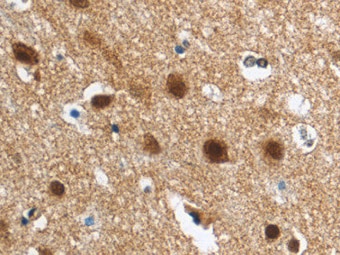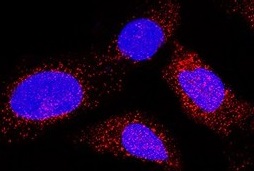Human Neurogranin Antibody Summary
Met1-Asp78
Accession # Q92686
Applications
Please Note: Optimal dilutions should be determined by each laboratory for each application. General Protocols are available in the Technical Information section on our website.
Scientific Data
 View Larger
View Larger
Detection of Human, Mouse, and Rat Neurogranin by Western Blot. Western blot shows lysates of human brain (motor cortex), mouse brain, and rat brain. PVDF membrane was probed with 2 µg/mL of Mouse Anti-Human Neurogranin Monoclonal Antibody (Catalog # MAB79471) followed by HRP-conjugated Anti-Mouse IgG Secondary Antibody (HAF018). A specific band was detected for Neurogranin at approximately 14-15 kDa (as indicated). This experiment was conducted under reducing conditions and using Western Blot Buffer Group 1.
 View Larger
View Larger
Neurogranin in SW480 Human Cell Line. Neurogranin was detected in immersion fixed SW480 human liposarcoma cell line (positive staining) and MOLT‑4 human acute lymphoblastic leukemia cell line using Mouse Anti-Human Neurogranin Monoclonal Antibody (Catalog # MAB79471) at 8 µg/mL for 3 hours at room temperature. Cells were stained using the NorthernLights™ 557-conjugated Anti-Mouse IgG Secondary Antibody (red; NL007) and counterstained with DAPI (blue). Specific staining was localized to cytoplasm. Staining is performed using our protocol for Fluorescent ICC Staining of Non-adherent Cells.
 View Larger
View Larger
Neurogranin in Human Brain (Cortex). Neurogranin was detected in immersion fixed paraffin-embedded sections of human brain (cortex) using Mouse Anti-Human Neurogranin Monoclonal Antibody (Catalog # MAB79471) at 5 µg/mL for 1 hour at room temperature followed by incubation with the Anti-Mouse IgG VisUCyte™ HRP Polymer Antibody (Catalog # VC001). Before incubation with the primary antibody, tissue was subjected to heat-induced epitope retrieval using Antigen Retrieval Reagent-Basic (Catalog # CTS013). Tissue was stained using DAB (brown) and counterstained with hematoxylin (blue). Specific staining was localized to cytoplasm in neurons. View our protocol for IHC Staining with VisUCyte HRP Polymer Detection Reagents.
 View Larger
View Larger
Detection of Human, Mouse, and Rat Neurogranin by Simple WesternTM. Simple Western lane view shows lysates of human brain (motor cortex), mouse brain, and rat brain, loaded at 0.2 mg/mL. A specific band was detected for Neurogranin at approximately 12 kDa (as indicated) using 10 µg/mL of Mouse Anti-Human Neurogranin Monoclonal Antibody (Catalog # MAB79471). This experiment was conducted under reducing conditions and using the 2-40 kDa separation system.
Reconstitution Calculator
Preparation and Storage
- 12 months from date of receipt, -20 to -70 °C as supplied.
- 1 month, 2 to 8 °C under sterile conditions after reconstitution.
- 6 months, -20 to -70 °C under sterile conditions after reconstitution.
Background: Neurogranin
NRGN (Neurogranin/Ng; also known as RC3, p17 and BICKS) is a member of the neurogranin family of proteins. Although its predicted MW is 7.5 kDa, it runs anomalously at 15-19 kDa in SDS-PAGE. This is apparently due to the adoption of a rigid alpha -helical structure in a negatively charged medium. NRGN has limited expression, being found principally in excitatory neurons of the telencephalon, Golgi and Purkinje cells of the cerebellum, and platelets plus B and T cells in non-nervous tissue. Intracellularly, NRGN is found associated with membranes of the ER, Golgi and mitochondria. This association is often in the form of aggregates (or granules), thus giving rise to its name ("neuro-granules"). NRGN is also found in the nucleus and associated with the postsynaptic spines of dendrites. The principal function of NRGN appears to be the binding, sequestration and concentration of CaM (Calmodulin; a Ca-binding protein) in dendritic spines. Following NMDAR activation, Ca diffuses into the synaptic area, resulting in 1) the simply dissociation of CaM from NRGN, or 2) the phosphorylation of NRGN followed by its dissociation fro CaM. In either case, the freed CaM is now available to activate multiple downstream signaling pathways, some involved in LTP (or memory). Human NRGN is 78 amino acids (aa) in length. It contains one IQ domain (aa 26-47) that binds CaM, and a collagen-like region at the C-terminus (aa 48-78). Regulatory phosphorylation occurs on Ser36, and the N-terminal Met is acetylated. Full-length human NRGN shares 96% aa sequence identity with both mouse and rat NRGN.
Product Datasheets
FAQs
No product specific FAQs exist for this product, however you may
View all Antibody FAQsReviews for Human Neurogranin Antibody
Average Rating: 5 (Based on 2 Reviews)
Have you used Human Neurogranin Antibody?
Submit a review and receive an Amazon gift card.
$25/€18/£15/$25CAN/¥75 Yuan/¥2500 Yen for a review with an image
$10/€7/£6/$10 CAD/¥70 Yuan/¥1110 Yen for a review without an image
Filter by:



